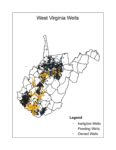Hydrogen Sulfide, also known as “H2S”, or “sour gas”, is sometimes included with the conventional natural gas that comes out of gas wells in West Virginia. There are measures that drillers employ to prevent problems with H2S when it is expected during drilling and afterwards during production. There are lots of wells in West Virginia that produce H2S for which no problems have been reported. Gas wells and pipelines usually sit in the open, and gas, at least in small amounts, probably disperses quickly. But it may also be that we do not know much about the effects of long term exposures in low concentrations.
Here is a web site that explains more about H2S, though it is based primarily on conditions in the West. If H2S leaks in high concentrations, however, we know it can be deadly. It is rare, but there have been deaths of oil and gas field workers working on wells in West Virginia that produce H2S. If you are near a well or pipeline and smell gas, you should report it to the Office of Oil and Gas. It probably is not H2S, but it could be. Hydrogen sulfide has a characteristic rotten egg odor at low concentrations. At higher concentrations, hydrogen sulfide rapidly deadens the sense of smell. The inspector for the Office of Oil and Gas will know if it is an H2S well. Whether or not it is an H2S well, gas should not leak wastefully into the atmosphere.
If you are standing in one spot near a well, particularly if you can hear gas leaking, and without moving you first smell a sour smell and then stop smelling it, you should run away — preferably up hill, it is heavier than air. Your nose will only smell H2S in low concentrations. If you stop smelling it, it could be that the breeze has blown it away, or though rare, it could be that the concentration has become very dangerous and you just cannot smell it.




